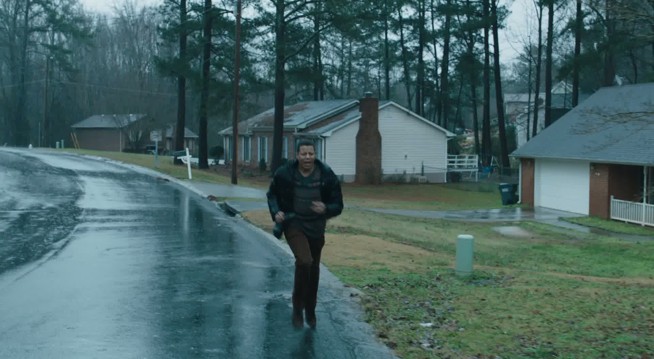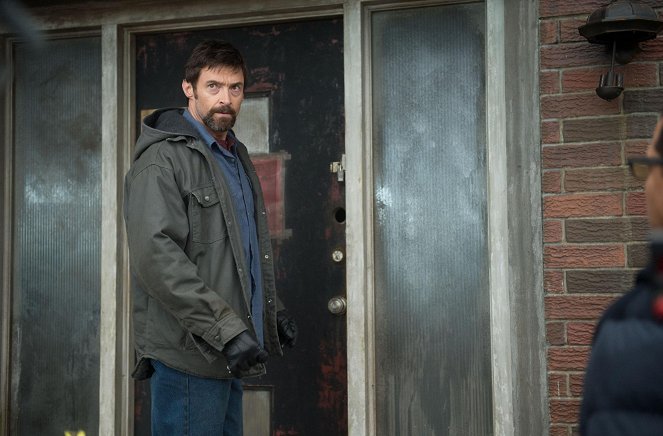Director:
Denis VilleneuveGuión:
Aaron GuzikowskiCámara:
Roger DeakinsMúsica:
Jóhann JóhannssonReparto:
Hugh Jackman, Jake Gyllenhaal, Viola Davis, Maria Bello, Terrence Howard, Melissa Leo, Paul Dano, Dylan Minnette, Zoë Soul, Erin Gerasimovich, Kyla-Drew (más)Streaming (4)
Sinopsis(1)
Keller Dover se enfrenta a la peor pesadilla de un padre. Anna, su hija de seis años, ha desaparecido, junto a su amiga Joy, y a medida que los minutos se convierten en horas, le va invadiendo el pánico. La única pista: una destartalada autocaravana que estuvo aparcada anteriormente en su calle. Encabeza la investigación, el detective Loki, quién detiene a su conductor, Alex Jones, pero la falta de pruebas le obliga a devolverle la libertad. Aunque la policía sigue múltiples pistas, la presión va en aumento al saber que la vida de su hija está en juego. El desesperado Dover decide que no tiene más remedio que ocuparse personalmente del asunto, pero ¿hasta dónde está dispuesto a llegar este padre desesperado para proteger a su familia? (Warner Bros. España)
(más)Videos (5)
Reseñas (16)
El final no me noqueó tanto teniendo en cuenta la atmósfera magistral anterior, la escalada de tensión y los juegos de guión imaginativos con las expectativas del espectador. Pero el último corte, la transición a los créditos finales, es bueno.
()
La desaparición ofrece una experiencia cinematográfica muy intensa e impresionante. El guion requería un elenco de actores de calidad, de lo contrario todo podría haber sido un desastre. Hugh Jackman es más que convincente en el papel de un padre desesperado, Terrence Howard interpreta a otro padre igualmente desesperado pero menos obstinado de manera impecable, Jake Gyllenhaal también es creíble y natural, y Paul Dano confirma su versatilidad. ¿Y actrices como Viola Davis o Melissa Leo tocando el segundo violín? Ni de casualidad. Especialmente Melissa tiene personajes trágicos profundamente arraigados bajo la piel. Tenía preocupación por la duración excesiva de la película, pero la tensión está bien construida, así que no me aburrí. Aunque tal vez el desenlace sea un poco descriptivo, no perjudica la impresión general. Creo que aquí definitivamente nacerá algo, al menos el éxito entre el público y algún premio para los actores.
()
An absolutely amazing movie with awesome atmosphere that utilizes its characters, the weather and moods. It completely analyzes the individual details of the situations and the characters themselves. That’s how I like it, and that’s exactly what I get out of American production once every two years, if at all. The first movie I saw that was done with such precision was Seven. That’s exactly what I’ve been thinking of while watching this movie. But I’m sorry that I still can’t give it the full five stars. There were scenes where I needed a deeper explanation. And I don’t think there was any time left for that explanation. It was long enough and if it was just ten minutes longer, I probably wouldn’t have managed. Anyway, Hugh Jackman and Jack Gyllenhaal’s acting was really amazing. They both tuned into the roles so well that I saw all the individual nuances that made it different from ordinary acting performances. Hugh becomes a wreck, and Jack’s face ticks get worse and worse by each passing minute, all the way to the finale. A great movie and precise filmmaking. I wish there were more of those.
()
Prisoners bears the hallmarks of a high-quality psychological drama and a very good crime thriller. However, it ultimately falls short on both genre levels. As a character-focused film, it fails due to the restrained (even in the context of the situations in which the characters find themselves) or, conversely, exceedingly prudent actions of the protagonists. With the exception of Jackman, about whom the hunting prologue tells us most of what’s important, and Gyllenhaal, who adds a peculiar element to his performance with suspiciously frequent blinking (which could indicate that he has a dark past, or that he simply has a facial tick), the actors in the film are dead weight. They do not help with evoking the morally ambivalent feelings that comprise the core of the narrative, as Villeneuve doesn’t bother to better justify their infrequent presence or involve them in the main action. Keller’s wife pays the highest price for the utilitarian handling of the characters. Of all the actors, Maria Bello overacts most aggressively, so we needn’t feel sorry for her as she sometimes wearily and sometimes hysterically staggers her way through the film. ___ The film’s sense of gravitas is apparently supposed to be bolstered by long shots (of tree bark, for example), frequent fade-outs, heavy rain, the use of ambient noise instead of non-diegetic music (which is similarly cacophonous as the aforementioned noise, so – like in Fincher’s The Girl with the Dragon Tattoo – it is sometimes difficult to tell where one ends and the other begins). These are not very original means of evoking a gloomy atmosphere, but they generally serve the purpose. However, Villeneuve overuses them and because of that – among other things – the film fails as a procedural thriller. ___ Shots intended to shape the atmosphere predominate over shots that convey any determinative information. Furthermore, most of the essential revelations are based on unconvincing coincidences rather than on collecting and analysing evidence. The length of the investigation (and thus of the film) is not proportionate to the manner of revealing the perpetrator. At the end, you will come to the most powerful realisation that the whole investigative storyline, with all of its dead ends and ambiguous clues, was designed solely for the purpose of forcing the characters to face certain moral dilemmas so that they would both experience and do something very unpleasant and somehow redeem themselves after staggering out of the labyrinth of (a)morality (this involves one of the many traditional religious motifs that the film works with, along with serpents, crucifixes and Bible quotes). ___ If Villeneuve cared primarily about the psychological level of the narrative, why does he devote so much space to the investigative level, spending most of the film trying to convince us that this is a crime movie after all? The two different levels ultimately weaken each other. Disinterest in the past and deeply rooted motivations of the characters can be accepted in a procedural, but not in a psychological film. Holes in the logic would not matter so much in a psychological study of a person in an extreme situation, but they are distracting in a detective story. Instead of one consistent film, Villeneuve made two films, both of which are thoroughly unsatisfying. 70%
()
(menos)
(más)
There hasn’t been such a good crime film since Fincher’s Zodiac. It has all the necessary ingredients mixed in a balanced ratio: a perfectly bleak, brooding atmosphere (cinematographer Deakins once again reigns supreme), acting sure-footedness where once again – as in Fincher's masterpiece – I loved Gyllenhaal with his beleaguered police figure, and a perfect screenplay that looks like an adaptation of an ingeniously written novel by one of the Nordic authors who reign supreme in the detective fiction genre today. And on top of that the shit-phile called verbal gave it 1*, so I don't know what better recommendation you'd want :o)
()



Anuncio